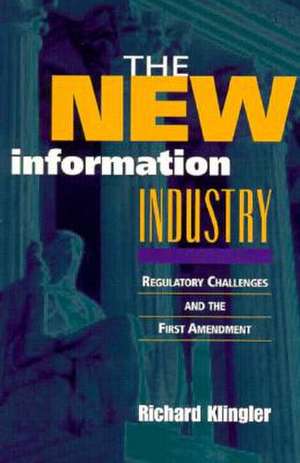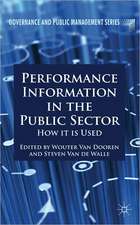The New Information Industry: Regulatory Challenges and the First Amendment
Autor Richard Klingleren Limba Engleză Paperback – iun 1996
Rapid developments in technology are reshaping how citizens receive and use information electronically. At the same time, government regulation limits the services that may be offered by the industries that transmit information, and will determine how interactive and other advanced video services are able to develop. In this book, Richard Klingler traces the evolution of regulatory regimes that constrain the broadcasting, telephone, and cable television industries, as well as emerging information services. He also examines new information delivery systems and the integration of electronic carriage with provision of content and information services, including services that resemble printed products.
Klingler describes two basic challenges to current regulation of these industries. First, established regulatory regimes often harm competition and the development of services in industries that are increasingly interrelated and rapidly changing. He outlines how recent developments contradict basic assumptions underlying the structure of current regulation and how regulation might better respond to those developments. Second, the Constitution limits regulation of these industries as they increasingly engage in activities protected by the First Amendment. Klingler shows how the First Amendment, as recently elaborated, applies to electronic transmission of information and likely precludes certain forms of regulation, including established regulation of the content of communications. The book also examines how regulation designed to limit market power in these industries can be reconciled with the First Amendment.
Klingler describes two basic challenges to current regulation of these industries. First, established regulatory regimes often harm competition and the development of services in industries that are increasingly interrelated and rapidly changing. He outlines how recent developments contradict basic assumptions underlying the structure of current regulation and how regulation might better respond to those developments. Second, the Constitution limits regulation of these industries as they increasingly engage in activities protected by the First Amendment. Klingler shows how the First Amendment, as recently elaborated, applies to electronic transmission of information and likely precludes certain forms of regulation, including established regulation of the content of communications. The book also examines how regulation designed to limit market power in these industries can be reconciled with the First Amendment.
Preț: 197.54 lei
Nou
Puncte Express: 296
Preț estimativ în valută:
37.80€ • 40.42$ • 31.52£
37.80€ • 40.42$ • 31.52£
Carte tipărită la comandă
Livrare economică 17 aprilie-01 mai
Preluare comenzi: 021 569.72.76
Specificații
ISBN-13: 9780815749431
ISBN-10: 0815749430
Pagini: 218
Dimensiuni: 152 x 229 x 15 mm
Greutate: 0.31 kg
Ediția:New.
Editura: Brookings Institution Press
Colecția Brookings Institution Press
ISBN-10: 0815749430
Pagini: 218
Dimensiuni: 152 x 229 x 15 mm
Greutate: 0.31 kg
Ediția:New.
Editura: Brookings Institution Press
Colecția Brookings Institution Press
Notă biografică
Richard Klingler is a partner at Sidley Austin LLP. He served from 2006-2007 as the General Counsel and Legal Adviser on the National Security Council staff.
Descriere
Rapid developments in technology are reshaping how citizens receive and use information electronically. At the same time, government regulation limits the services that may be offered by the industries that transmit information, and will determine how interactive and other advanced video services are able to develop. In this book, Richard Klingler traces the evolution of regulatory regimes that constrain the broadcasting, telephone, and cable television industries, as well as emerging information services. He also examines new information delivery systems and the integration of electronic carriage with provision of content and information services, including services that resemble printed products.
Klingler describes two basic challenges to current regulation of these industries. First, established regulatory regimes often harm competition and the development of services in industries that are increasingly interrelated and rapidly changing. He outlines how recent developments contradict basic assumptions underlying the structure of current regulation and how regulation might better respond to those developments. Second, the Constitution limits regulation of these industries as they increasingly engage in activities protected by the First Amendment. Klingler shows how the First Amendment, as recently elaborated, applies to electronic transmission of information and likely precludes certain forms of regulation, including established regulation of the content of communications. The book also examines how regulation designed to limit market power in these industries can be reconciled with the First Amendment.
Klingler describes two basic challenges to current regulation of these industries. First, established regulatory regimes often harm competition and the development of services in industries that are increasingly interrelated and rapidly changing. He outlines how recent developments contradict basic assumptions underlying the structure of current regulation and how regulation might better respond to those developments. Second, the Constitution limits regulation of these industries as they increasingly engage in activities protected by the First Amendment. Klingler shows how the First Amendment, as recently elaborated, applies to electronic transmission of information and likely precludes certain forms of regulation, including established regulation of the content of communications. The book also examines how regulation designed to limit market power in these industries can be reconciled with the First Amendment.











